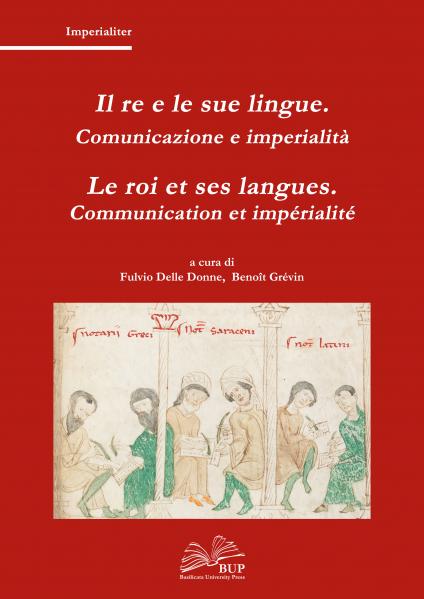BUP new website
ATTENTION PLEASE
Starting from April 16, 2025, the BUP will be accessible
HERE
Series: Imperialiter, 2
Language: Italian, French
Pages: 176
Published: 2023
ISBN: 978-88-31309-20-2
NBN: http://nbn.depositolegale.it/resolver.pl?nbn=urn:nbn:it:unina-29004
Abstract: Was there ever an imperial ideology connected with linguistic communication in late medieval and early modern Europe? And, if so, were there rulers outside the Germanic or Byzantine empires who attempted to define or impose a “linguistic imperiality”? By exploring the recovery in different contexts of an imperial Latin, Greek or even Arabic "syntax", this volume offers an in-depth investigation into the management of multilingualism in political spaces located outside or on the fringes of the Empire. From Sicily to England, from Poland to the Serbian-Hungarian borders, from the 12th to the 17th century, the articles of this book follow the jagged lines of the complex dialectical relationships between pragmatic uses and ideological representations of languages, which cooperate, in the long run, in the construction of suggestive forms of “derived” or “secondary” imperiality.
Summary
Benoît Grévin, Le roi de langues et l’empereur. Y a-t-il eu un modèle «impérial» de gestion linguistique au bas Moyen Âge et à l’époque moderne (1100-1700/1792)?: 7
Guido Cappelli - Fulvio Delle Donne, Considerazioni sul Latino come lingua imperiale (secc. XII-XVI): 31
Lars Boje Mortensen, L’auto-rappresentazione imperiale nella letteratura occidentale (1050-1200 ca.): 51
Benoît Grévin, Ampleur et limite d’une impérialisation: les modèles rhétoriques impériaux et leurs réemplois royaux en Europe occidentale et centrale (fin XIIIe-début XVe siècle): 69
Annick Peters-Custot, Langue(s) d’Empire et langue(s) impériale(s) dans le royaume Hauteville de Sicile: 105
Aude Mairey, Langues et impérialité seconde dans les îles Britanniques à la fin du Moyen Âge: 123
Benjamin Landais, Langues de gouvernement et gouvernement des langues: l’allemand face aux langues ‘nationales’ dans les confins orientaux de la monarchie habsbourgeoise au XVIIIe siècle: 147
Fulvio Delle Donne is Professor of Medieval and Humanistic Latin Literature at the University of Basilicata. His extensive scientific production combines philological-literary and historical methods and interests, covering a wide chronological arch (VI-XVI sec). His bibliography includes many critical editions and monographic volumes for prestigious publishers and numerous articles for international scientific journals. He is the President of the European Center for Studies on Aragonese Humanism and Renaissance - CESURA (www.cesura.info).
Benoît Grévin is research director at the CNRS (CRH, UMR 8558). Former member of the French School of Rome, he studies the history of medieval linguistic and rhetorical cultures, with a particular interest in the rhetoric of power in the late Middle Ages, for cultural transfers in the Mediterranean and for comparatism. He has notably published Rhétorique du pouvoir médiéval. Les Lettres de Pierre de la Vigne et la formation du langage politique européen (XIIIe-XVe siècle), Roma, École française de Rome, 2008; Le parchemin des cieux. Essai sur le Moyen âge du langage, Paris, Seuil, 2012; La Première Loi du royaume. L’acte de fixation de la majorité des rois de France (1374), Paris, Garnier, 2021.


This work is licensed under a Creative Commons Attribution-NonCommercial-ShareAlike 4.0 International License.
ATTENTION PLEASE
Starting from April 16, 2025, the BUP will be accessible
HERE
